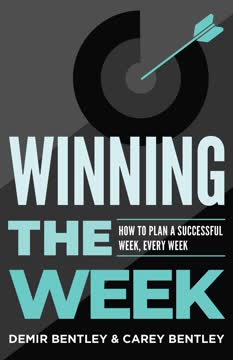Key Takeaways
1. Plan Your Week to Win Your Week
Planning your week ahead of time is the key to winning your week.
Planning is essential. The core message is clear: proactive planning is the cornerstone of a successful week. Despite its apparent simplicity, this concept is often overlooked, with less than 1% of people consistently planning their weeks effectively. This involves setting aside dedicated time to map out priorities, schedule tasks, and anticipate potential obstacles.
Weekly cadence. The book emphasizes the importance of a weekly planning cycle, aligning with the natural rhythm of the workweek and weekend. This cadence provides regular opportunities for reflection, adjustment, and improvement. It's a manageable timeframe that allows for both accomplishment and learning.
Benefits of planning. Planning provides a framework for making informed decisions about how to allocate time and energy. It helps to identify potential conflicts, prioritize tasks, and ensure that the most important goals are addressed. It also reduces stress and anxiety by providing a sense of control and direction.
2. Overcome Resistance to Planning
Even in a perfect planning session, you will feel stress, anxiety, and fear. That means you’re doing it right!
Resistance is natural. The book acknowledges that planning can be a stressful and anxiety-provoking process, triggering the limbic system's fight-or-flight response. This resistance is a common obstacle that prevents many people from engaging in regular planning. It's important to recognize and address this resistance rather than ignoring it.
Rewire your brain. The key to overcoming resistance is to reframe planning as a positive and rewarding experience. This can be achieved by creating a dedicated planning ritual in a pleasant environment, associating it with enjoyable activities, and focusing on the benefits of planning.
Build a habit loop. The book suggests building a habit loop around planning, with a clear cue, routine, and reward. This helps to reinforce the behavior and make it more automatic over time. The reward should be something that is intrinsically motivating and enjoyable, such as a favorite beverage, a relaxing activity, or a sense of accomplishment.
3. Create a Weekly Feedback Loop
The best way to change long-term behavior is with short-term feedback.
Deliberate practice. The book emphasizes the importance of deliberate practice, which involves actively seeking feedback and making adjustments to improve performance. This requires a willingness to confront weaknesses and a commitment to continuous learning.
Groundhog Day Question. The book introduces two powerful questions to facilitate self-reflection: the "Groundhog Day Question" (If you could relive the past week a thousand times, what would the perfect execution have looked like?) and the "Double Down Question" (What worked well this week that I should double down on next week?). These questions help to identify areas for improvement and highlight successful strategies.
Counter negativity bias. The book encourages readers to counter their natural negativity bias by focusing on accomplishments and positive outcomes. This helps to build confidence and motivation, making it easier to stick to a planning routine. It's about recognizing the wins, big and small, and celebrating progress.
4. Prioritize with Leverage
Your leveraged priority for the week is the action that amplifies your force today and makes future tasks easier.
Effectiveness over efficiency. The book stresses the importance of effectiveness over efficiency, focusing on doing the right things rather than simply doing things quickly. This requires a clear understanding of goals and priorities, as well as the ability to identify high-impact activities.
Leveraging Question. The book introduces the "Leveraging Question" (What action can I take that makes everything else easier or unnecessary?) as a tool for identifying high-impact activities. This question encourages readers to think strategically about how to maximize their efforts and create a ripple effect of positive outcomes.
Real-world examples. The book provides real-world examples of leveraged priorities, such as implementing a new system for a team, creating a reusable template, or firing low-value clients. These examples illustrate the power of leverage in creating significant improvements in productivity and well-being.
5. Interrogate Your Calendar
The man who has anticipated the coming of troubles takes away their power when they arrive.
Time is finite. The book emphasizes the importance of recognizing time as a finite and valuable resource. This requires a shift in mindset from passively accepting commitments to actively managing and defending time. It's about treating time like a precious commodity that must be carefully allocated.
Landmines in your calendar. The book introduces the concept of "landmines" in the calendar, which are potential conflicts or unexpected events that can disrupt plans. Identifying and addressing these landmines in advance is crucial for preventing chaos and maintaining control.
Interrogation questions. The book provides a series of questions to guide the calendar interrogation process, such as: What shouldn't be on your calendar? What should be on your calendar but isn't? How much "flex time" will you need to deal with emergencies this week? These questions help to uncover hidden commitments, identify potential conflicts, and create a more accurate picture of time availability.
6. Triage Your Task List
You can do anything, but not everything.
Task triage. The book introduces the concept of task triage, which involves prioritizing tasks based on their urgency and importance. This requires a willingness to make tough choices and let go of the fantasy of "getting it all done." It's about focusing on the tasks that will have the greatest impact and deferring or delegating the rest.
Live-or-Die Task Triage Process. The book provides a decision tree to guide the task triage process, helping readers to determine which tasks should be done, which should be delayed, and which should be eliminated altogether. This process involves asking questions such as: Is it related to your number one leveraged weekly priority? Is it incredibly time-sensitive? Can this task be TACO'd?
TACO method. The book introduces the TACO method (Terminate, Automate, Consolidate, Outsource) as a tool for reducing the number of tasks on the to-do list. This method encourages readers to think creatively about how to eliminate unnecessary tasks, automate repetitive tasks, consolidate similar tasks, and delegate tasks to others.
7. Calendarize Your Tasks
A simple but profound principle of The Winning The Week Method is that when you say you’re going to get something done, you also block out time to do it. If you don’t do this, your plan is no plan at all.
From plan to action. The book emphasizes the importance of calendarizing tasks, which involves scheduling specific blocks of time in the calendar to work on each task. This transforms the to-do list from a wish list into a concrete plan of action. It's about making a commitment to when and where each task will be completed.
Eliminate wishful thinking. Calendarizing tasks helps to eliminate wishful thinking by forcing readers to confront the reality of their time constraints. This requires making tough choices about what can realistically be accomplished in a given week. It's about aligning aspirations with available resources.
Lifehack Calendarizing Process. The book provides a five-step process for calendarizing tasks, which involves: putting in the good stuff first, stacking in the deep work, putting in UUW time, stuffing shallow work into the cracks, and keeping going until all of your time supply has been allocated. This process helps to create a balanced and sustainable schedule that prioritizes both work and well-being.
8. Navigate, Don't Just Follow
The pessimist complains about the wind; the optimist expects it to change; the realist adjusts the sails.
Plans are guidelines. The book acknowledges that even the best-laid plans are subject to change. This requires a flexible mindset and a willingness to adapt to unexpected events. It's about viewing plans as guidelines rather than rigid rules.
Replanning is key. The book emphasizes the importance of replanning, which involves regularly reviewing and adjusting the schedule to accommodate changing circumstances. This requires a proactive approach to problem-solving and a willingness to make tough decisions.
Pushing back against chaos. The book provides strategies for pushing back against chaos, such as negotiating deadlines, delaying non-urgent tasks, and protecting deep work time. These strategies help to maintain focus and momentum in the face of distractions and interruptions.
9. Engineer a Focused Environment
You do not rise to the level of your goals. You fall to the level of your systems.
Distraction culture. The book acknowledges the pervasive nature of distraction in today's world, highlighting the negative impact of interruptions on productivity and well-being. This requires a conscious effort to create an environment that supports focus and concentration.
Communication policy. The book introduces the concept of a communication policy, which is a set of guidelines for how others can communicate with you in a way that minimizes distractions. This policy should specify preferred communication channels, response times, and emergency contact procedures.
Sticky Focus Game. The book introduces the "Sticky Focus Game" as a tool for enhancing focus and concentration. This game involves breaking down tasks into small, manageable chunks, setting a timer, and rewarding yourself for staying focused. It's a fun and engaging way to train the brain to resist distractions.
10. Design Powerful Accountability
The best way to change long-term behavior is with short-term feedback.
Social pressure. The book emphasizes the importance of social pressure in achieving goals, highlighting the power of accountability partners, teams, and public commitments. This requires a willingness to be vulnerable and to seek support from others.
Four Layers of Accountability. The book introduces the Four Layers of Accountability as a framework for creating a supportive and motivating environment. These layers include: a Bar Raiser, a Buddy, a Team, and Public Accountability. Each layer provides a different type of support and encouragement, helping to maintain momentum and overcome obstacles.
Intrinsic motivation. The book stresses the importance of intrinsic motivation, which is the desire to take action that comes from within. This requires aligning goals with values and finding activities that are inherently enjoyable. It's about creating a sense of purpose and meaning that fuels long-term commitment.
11. Debug Your Mindsets
Plans are worthless. But planning is indispensable.
Limiting truths. The book introduces the concept of limiting truths, which are beliefs that hold people back from achieving their full potential. These truths are often based on past experiences or negative self-talk. It's about recognizing and challenging these beliefs.
Higher truths. The book encourages readers to replace limiting truths with higher truths, which are more empowering and optimistic beliefs that support growth and success. This requires a shift in perspective and a willingness to embrace new possibilities.
Common limiting mindsets. The book identifies several common limiting mindsets, such as: "I don't have enough hours in the day," "I just can't stay focused," and "I don't control my time/money/priorities/schedule." By recognizing and addressing these mindsets, readers can unlock their full potential and achieve greater success in their personal and professional lives.
Last updated:
FAQ
1. What is "Winning the Week" by Demir Bentley about?
- Weekly Productivity System: "Winning the Week" presents a practical, step-by-step method for planning and executing a successful week, every week, to help readers achieve their goals without burning out.
- Focus on Planning: The book emphasizes the importance of weekly planning as the keystone to productivity, arguing that most people know planning is crucial but almost no one does it consistently or effectively.
- Counteracting Overwork: Drawing from the author’s personal experience with burnout and coaching high-achievers, the book addresses the modern epidemic of overwork and offers a sustainable alternative.
- Actionable Framework: Demir Bentley introduces "The Winning The Week Method," a structured, repeatable process designed to help anyone—from executives to parents—take control of their time and consistently feel victorious at the end of each week.
2. Why should I read "Winning the Week" by Demir Bentley?
- Escape Burnout Cycle: The book is ideal for hard workers who feel overwhelmed, stuck, or unable to enjoy their success due to constant busyness and lack of closure at the end of the week.
- Proven, Practical Advice: Demir Bentley’s method is based on years of coaching thousands of clients, including top executives and everyday professionals, with real-world examples and results.
- Holistic Life Improvement: The system is designed not just for work productivity, but for creating more time, energy, and satisfaction in all areas of life—work, family, health, and personal growth.
- Sustainable, Not a Fad: Unlike productivity fads, the method is built for long-term change, helping readers develop habits and mindsets that lead to lasting improvement.
3. What are the key takeaways from "Winning the Week" by Demir Bentley?
- Weekly Planning is Essential: Consistently planning your week ahead of time is the single most important factor in winning your week and avoiding burnout.
- Leverage Over Hard Work: Choosing a single, leveraged priority each week creates more impact and makes future tasks easier, rather than trying to do everything.
- Feedback Loops Drive Growth: Regular reflection and learning from each week create a positive feedback loop, leading to continuous improvement.
- Environment and Mindset Matter: Success comes from designing supportive environments, building accountability, and upgrading limiting mindsets—not just relying on willpower.
4. How does "The Winning The Week Method" by Demir Bentley work?
- Step-by-Step Process: The method consists of five main steps: Remove the Resistance, Learn a Lesson Each Week, Choose a Leveraged Priority, Interrogate Your Calendar, Triage Your Task List, and Allocate Time Demand to Supply.
- Remove Internal Barriers: The first step is to address and rewire the natural resistance most adults have to planning, making the process enjoyable and rewarding.
- Focus and Prioritization: The method helps you identify the single most leveraged priority for the week, ensuring your efforts have maximum impact.
- Reality-Based Planning: By rigorously interrogating your calendar and triaging your task list, you match your actual time supply to your most important demands, eliminating wishful thinking.
5. What is the "Foyer Mirror Test" in "Winning the Week" by Demir Bentley?
- End-of-Week Reflection: The Foyer Mirror Test is a metaphor for the moment you come home at the end of the week and unconsciously decide whether you "won" or "lost" the week.
- Emotional Closure: Passing the test means feeling a sense of accomplishment and closure, allowing you to fully enjoy your personal time and recharge.
- Conscious Decision: The book encourages making this moment conscious, using it as a checkpoint to assess your progress and reinforce positive habits.
- Indicator of Success: Regularly "winning" the Foyer Mirror Test is a sign that you’re applying the method effectively and living a more balanced, fulfilling life.
6. Why does "Winning the Week" by Demir Bentley focus on weekly planning instead of daily or monthly planning?
- Natural Rhythm: The week aligns with the natural cadence of work and rest in society, making it a practical and manageable unit for planning and reflection.
- Feedback and Flexibility: Weekly planning provides frequent feedback loops, allowing for regular course corrections and learning without the pressure of daily perfection.
- Leverages Parkinson’s Law: A week is long enough to make significant progress but short enough to create urgency, helping you avoid procrastination and maximize productivity.
- Integrates Skills: Weekly planning encourages the synchronization of various productivity skills into a cohesive workflow, rather than focusing on isolated techniques.
7. How do I overcome resistance to planning, according to "Winning the Week" by Demir Bentley?
- Understand the Source: Resistance to planning comes from the limbic system (the "lizard brain"), which associates planning with anxiety and discomfort.
- Make Planning Rewarding: Transform your planning session into a pleasurable ritual by pairing it with enjoyable activities or environments, making it something you crave rather than avoid.
- Build Positive Associations: Focus on the immediate, medium, and long-term benefits of planning to reinforce the habit and rewire your brain’s response.
- Use Habit Loops: Apply the cue-routine-reward model to establish planning as a sustainable habit, ensuring it becomes automatic over time.
8. What is a "leveraged priority" in "Winning the Week" by Demir Bentley, and how do I choose one?
- Definition: A leveraged priority is the one action you can take this week that will make everything else easier or unnecessary, amplifying your results with less effort.
- Avoiding Overwhelm: Instead of trying to do everything, focus on the single most impactful task, which prevents dilution of effort and burnout.
- The Leveraging Question: Ask yourself, "What is the one thing I can do such that, by doing it, everything else becomes easier or unnecessary?" (from Gary Keller’s "The One Thing").
- Real-World Examples: Leveraged priorities might include creating a new system, delegating a recurring task, or solving a bottleneck that frees up time and energy for future weeks.
9. How does "Winning the Week" by Demir Bentley recommend handling your calendar and task list?
- Interrogate Your Calendar: Go beyond a casual review—scrutinize your calendar for hidden commitments, necessary prep/travel time, and potential "landmines" that could derail your week.
- Triage Your Task List: Ruthlessly prioritize tasks using criteria like urgency, impact, and alignment with your leveraged priority; use the TACO method (Terminate, Automate, Consolidate, Outsource) to reduce your load.
- Match Demand to Supply: Allocate specific time blocks for each task, ensuring your planned workload fits your actual available time, and adjust as needed.
- Plan for Flexibility: Build in "UUW" (Unplanned, Unwanted Work) time to handle inevitable emergencies or surprises, keeping your week resilient.
10. What strategies does "Winning the Week" by Demir Bentley offer for executing your plan and staying focused?
- Replanning Daily: Take 15 minutes each day to review progress, adjust for new realities, and reallocate time as needed, treating your plan as a flexible guide.
- Gamify Focus: Use the "Sticky Focus Game"—breaking your day into focused work blocks using sticky notes and timers—to make deep work engaging and measurable.
- Block Distractions: Re-engineer your environment by setting communication policies, batching messages, and creating clear boundaries to minimize interruptions.
- Leverage Accountability: Build multiple layers of accountability (Bar Raiser, Buddy, Team, Public) to reinforce motivation and follow-through, especially when willpower wanes.
11. How does "Winning the Week" by Demir Bentley address mindset and limiting beliefs?
- Identify Limiting Truths: The book highlights common limiting beliefs (e.g., "I don’t have enough time," "I can’t focus," "I have too much on my plate") that keep people stuck.
- Replace with Higher Truths: For each limiting truth, Bentley offers a more empowering "higher truth" that opens up solutions and encourages ownership (e.g., "There is enough time for what matters if I take radical ownership of my time").
- Debug Your Mindsets: Treat mindset shifts as debugging your mental software—small changes in perspective can unlock major improvements in productivity and well-being.
- Practical Application: Through stories and exercises, the book shows how shifting mindsets leads to real-world transformations, even in challenging circumstances.
12. What are the best quotes from "Winning the Week" by Demir Bentley and what do they mean?
- "Planning your week ahead of time is the key to winning your week." – Emphasizes that proactive, intentional planning is the foundation of consistent success.
- "If everything is important, then nothing is important." – Reminds readers to focus on a single, leveraged priority rather than spreading themselves too thin.
- "Replanning isn’t abandoning the old plan. It’s fulfilling it in the face of changing circumstances." – Encourages flexibility and adaptability, seeing plans as living documents.
- "You can do anything, but not everything." – Stresses the necessity of triage and making tough choices to maximize impact.
- "The Winning The Week Method is not just about winning at work—it’s about winning the whole enchilada of life." – Highlights the holistic nature of the method, aiming for fulfillment in all areas, not just professional achievement.
Review Summary
Winning the Week receives mostly positive reviews, with readers praising its practical approach to productivity and time management. Many find the weekly planning method helpful and easy to implement. Reviewers appreciate the book's focus on work-life balance and emphasis on prioritizing important tasks. Some readers note that the content may be familiar to those already versed in productivity techniques. A few mention that the system may not work for everyone, particularly neurodivergent individuals. Overall, readers find the book valuable for improving their weekly planning and achieving their goals.
Similar Books
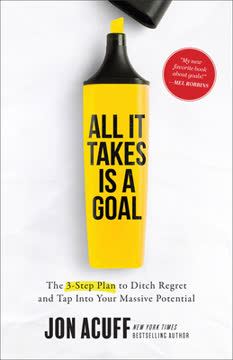

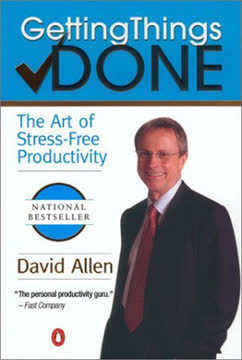


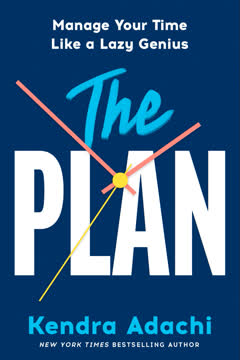
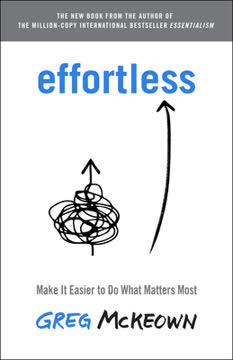

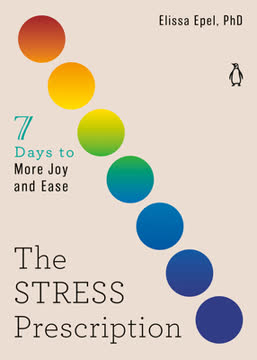
Download PDF
Download EPUB
.epub digital book format is ideal for reading ebooks on phones, tablets, and e-readers.
